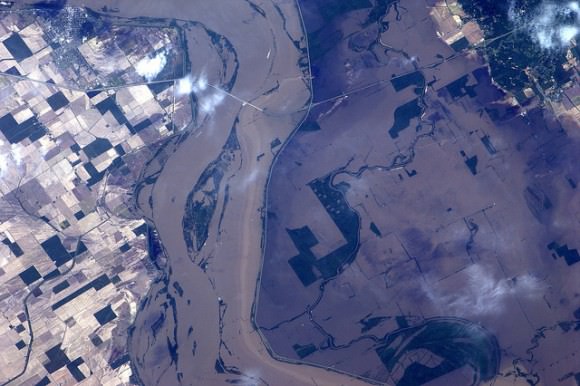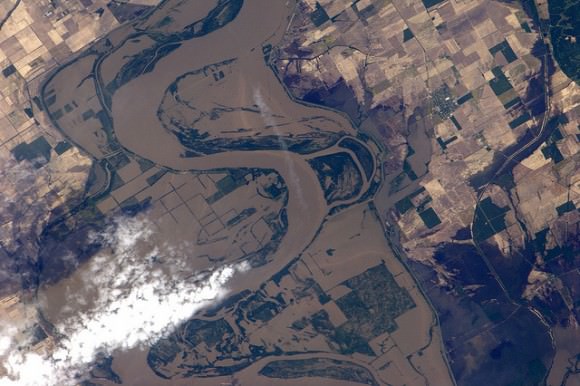"On April 26, 1876, the Mississippi River accomplished what the Union army could not accomplish 13 years prior -- theriver cut across DeSoto peninsula, breaking DeSoto Point and destroying what was left of the Vicksburg, Shreveport and Texas railroad terminal and ferry.
This break effectively cut off the east-west rail line. More importantly, it left the river port of Vicksburg with no river. The economic effect on the city was devastating."
Wired describes the power of the river this way:
"For thousands of years, the Mississippi River went wherever whim or Mother Nature dictated -- flooding lowlands during high-water times, changing its course, shifting channels, occasionally even turning bustling harbors into barren mud flats overnight, as it made its way from its headwaters in Minnesota to the Gulf of Mexico."The Army Corps of Engineers, in one of it's earliest projects, gave Vicksburg their river back:
"In 1873, a Vicksburg office of the Army Corps of Engineers was established to coordinate federal and local river management and flood control efforts...
...In 1878, the city appealed to the government for assistance in restoring its port area. An extensive study of port restoration by the Corps of Engineers resulted in a massive undertaking that diverted the Yazoo River south through the former bed of the Mississippi River. The Yazoo River Diversion Project, along with other stabilization projects, took 25 years to complete. On January 7, 1903, the city of Vicksburg officially opened the diversion canal and started to reassert herself as a river city."The United States eventually ended up with the Flood Control Act of 1936, signed into law by President Franklin Delano Roosevelt as part of his New Deal conglomeration:
" FCA 1936 dictated that Federal investigations and improvements of rivers and other waterways for flood control and allied purposes shall be under the jurisdiction of the War Department (precursor of the Department of Defense under the supervision of the Chief of Engineers. It further put watersheds, waterflow retardation, and soil erosion prevention under the Department of Agriculture."But Wired explains what they're up against:
"Humans have tried to tame the river, devising various ways to force the Mississippi to conform to people's need for flood-free lands, a navigable river and predictable ports. Occasionally the river would tolerate such restrictions, but more often it would not. Humans discovered that when they tried to control the river, it would usually respond by overflowing its banks or creating new channels.
"The Mississippi River is happiest when it's left alone," said Michael Logue, chief of public affairs for the Army Corps of Engineers. "But without human intervention, the Mississippi River would change course, putting thousands of acres of land underwater while leaving busy ports high and dry."

Flood water from the Mississippi river near New Madrid, Missouri, as seen by Paolo Nespoli on board the International Space Station. Credit:ESA/NASA

Flooding near Caruthersville, Missouri. Farmland, roads and bridges are under water. Credit: ESA/NASA

Flooding near Ridgely, Tennessee. Credit: ESA/NASA
In an attempt to contain massive flooding of major cities along the Mississippi, selected areas are being purposely flooded in order to save Baton Rouge and New Orleans. 1.5 million cubic feet per minute are currently spilling into small towns and farmlands of Louisiana. The Columbian reports:
A steel, 10-ton floodgate was slowly raised Saturday for the first time in nearly four decades, unleashing a torrent of water from the Mississippi River, away from heavily populated areas downstream.
The water spit out slowly at first, then began gushing like a waterfall as it headed to swamp as much as 3,000 square miles of Cajun countryside known for small farms and fish camps. Some places could wind up under as much as 25 feet of water.
Opening the Morganza spillway diverts water away from Baton Rouge and New Orleans, and the numerous oil refineries and chemical plants along the lower reaches of the Mississippi.

"We can't leave the Mississippi to just run amok -- the river is one of the primary reasons that America is a superpower. It's the major artery in America's heartland that allows goods to travel swiftly to buyers," Logue said. "If the river shifts course, America could quickly become a second-world country."
The Corps has been trying to tame the river for a long time, but some of its best efforts caused disasters. The flood of 1927 -- when the Mississippi broke out of its levee system in 145 places, flooded more than 27,000 square miles with up to 30 feet of water, caused over $400 million in damages and killed 246 people in seven states -- is a great example. The flood was caused -- or worsened -- in part by the Corps' attempts to control the river by building a levee system, which resulted in a deeper, fiercer Mississippi."
All of this is a good reminder to us of how little control we have over the environment. The God of the Universe holds the world in his hands and controls the seasons, the rising and setting of the sun, and the flow of the rivers. He reminded Job of that fact when Job thought he knew better than God in Job 38:
Then the LORD answered Job out of the whirlwind and said:
"Who is this that darkens counsel by words without knowledge? Dress for action like a man; I will question you, and you make it known to me.
Where were you when I laid the foundation of the earth? Tell me, if you have understanding. Who determined its measurements—surely you know! Or who stretched the line upon it? On what were its bases sunk, or who laid its cornerstone, when the morning stars sang together and all the sons of God shouted for joy?
Or who shut in the sea with doors when it burst out from the womb, when I made clouds its garment and thick darkness its swaddling band, and prescribed limits for it and set bars and doors, and said, 'Thus far shall you come, and no farther, and here shall your proud waves be stayed'?
Have you commanded the morning since your days began, and caused the dawn to know its place, that it might take hold of the skirts of the earth and the wicked be shaken out of it?It is changed like clay under the seal, and its features stand out like a garment. From the wicked their light is withheld, and their uplifted arm is broken.
Have you entered into the springs of the sea, or walked in the recesses of the deep?Have the gates of death been revealed to you, or have you seen the gates of deep darkness? Have you comprehended the expanse of the earth? Declare, if you know all this.
Where is the way to the dwelling of light, and where is the place of darkness that you may take it to its territory and that you may discern the paths to its home? You know, for you were born then, and the number of your days is great!
Have you entered the storehouses of the snow, or have you seen the storehouses of the hail, which I have reserved for the time of trouble, or the day of battle and war? What is the way to the place where the light is distributed, or where the east wind is scattered upon the earth?
Who has cleft a channel for the torrents of rain and a way for the thunderbolt, to bring rain on a land where no man is, on the desert in which there is no man, to satisfy the waste and desolate land, and to make the ground sprout with grass? Has the rain a father, or who has begotten the drops of dew?
From whose womb did the ice come forth, and who has given birth to the frost of heaven? The waters become hard like stone, and the face of the deep is frozen.
Can you bind the chains of the Pleiades, or loose the cords of Orion? Can you lead forth the Mazzaroth in their season, or can you guide the Bear with its children? Do you know the ordinances of the heavens? Can you establish their rule on the earth?
Can you lift up your voice to the clouds, that a flood of waters may cover you? Can you send forth lightnings, that they may go and say to you, 'Here we are'?
Who has put wisdom in the inward parts or given understanding to the mind? Who can number the clouds by wisdom? Or who can tilt the waterskins of the heavens,when the dust runs into a mass and the clods stick fast together?
Can you hunt the prey for the lion, or satisfy the appetite of the young lions, when they crouch in their dens or lie in wait in their thicket? Who provides for the raven its prey, when its young ones cry to God for help, and wander about for lack of food?"
God starts out by saying, "Who is this that darkens counsel by words without knowledge?"
The Message version, which is a very loose paraphrase, puts it this way: "Why do you talk when you don't know what you're talking about?" When engineers are talking about controlling the Mississippi River, I suspect they are wandering into this territory.
No comments:
Post a Comment